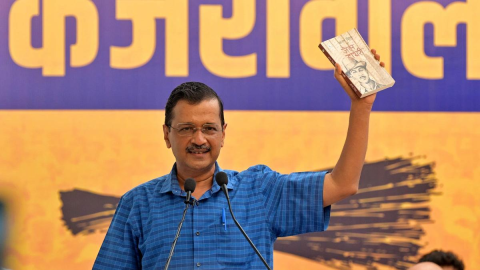Arvind Kejriwal Shocks People With Resignation Announcement; To seek Fresh Mandate from Public
Delhi Chief Minister Arvind Kejriwal announced his decision to resign from his post in the coming two days, following his release on bail in connection with the Delhi Excise Policy scam. Addressing party workers at the AAP headquarters, Kejriwal emphasized that his resignation was a direct appeal to the public to decide whether they view him as honest or guilty. He also called for early elections in November, aligning with Maharashtra’s polls, and stated that a new CM would be named soon. Kejriwal's statements reflect both a strategic political move and a broader challenge to the opposition.
Resignation of Arvind Kejriwal: An Appeal to Public Trust
Public Verdict Over Legal Allegations
Delhi CM Arvind Kejriwal declared that he would resign from his position within two days, placing the decision of his political future in the hands of the Delhi public. Kejriwal, recently released on bail from the Delhi Excise Policy scam, questioned whether the people saw him as "honest or a criminal." This resignation signals a direct appeal to the electorate to reaffirm their trust in him, while framing his departure as temporary, dependent on a future mandate from the voters.
AAP’s Leadership Transition and Election Strategy
New Chief Minister to Be Announced Soon
Kejriwal revealed that his party, the Aam Aadmi Party (AAP), would name a new Chief Minister shortly, following a meeting of AAP MLAs within the next two to three days. He reiterated his call for Delhi elections to be held in November, coinciding with Maharashtra’s polls, rather than the scheduled date in February. This strategic maneuver emphasizes Kejriwal’s confidence in public support and signals his party’s preparedness for an early election.
Kejriwal’s Jail Experience: Political Symbolism
Comparisons to Bhagat Singh
Drawing a symbolic parallel, Kejriwal compared his recent jail time to the experiences of Shaheed Bhagat Singh, suggesting that, like the freedom fighter, he too has faced undue hardship at the hands of a "cruel" government. Kejriwal remarked that even during British rule, prisoners had more rights, and he criticized the authorities for not delivering his letter requesting Atishi to hoist the national flag on August 15. His comments frame his incarceration as part of a larger political struggle against an oppressive government.
AAP’s Fight Against Alleged Conspiracies
Accusations Against the BJP
Kejriwal accused the BJP of conspiring to weaken the Aam Aadmi Party by targeting him and attempting to topple AAP-led governments in Delhi and Punjab. He asserted that the BJP’s strategy of breaking MLAs and sending him to jail had not only failed but also strengthened his resolve. By invoking the struggle of Bhagat Singh, Kejriwal portrayed his fight as part of a broader battle for justice, positioning AAP as the party fighting against perceived government overreach.
Former Deputy CM Manish Sisodia’s Rebuttal
Claims of a "Fictional" Liquor Scam
Senior AAP leader and former Deputy CM Manish Sisodia weighed in, accusing the BJP of crafting a "fictional" story around the Liquor Scam to damage AAP’s reputation. Sisodia framed the Supreme Court’s bail decision as a victory for Kejriwal, suggesting that it marked the end of the BJP’s narrative. He also highlighted Kejriwal as a symbol of hope for millions of Indians, particularly those who seek improved access to education, healthcare, and electricity.
Kejriwal: A Symbol of National Hope?
Beyond AAP: National Implications
In his concluding remarks, Sisodia positioned Arvind Kejriwal as not just the leader of AAP, but a national figure representing the aspirations of millions across India. By linking Kejriwal’s governance to critical public services such as free education, healthcare, and electricity, Sisodia underscored his relevance to the larger electorate. This suggests that the upcoming elections will not only test AAP’s local strength but also Kejriwal’s potential to influence the national political landscape.
